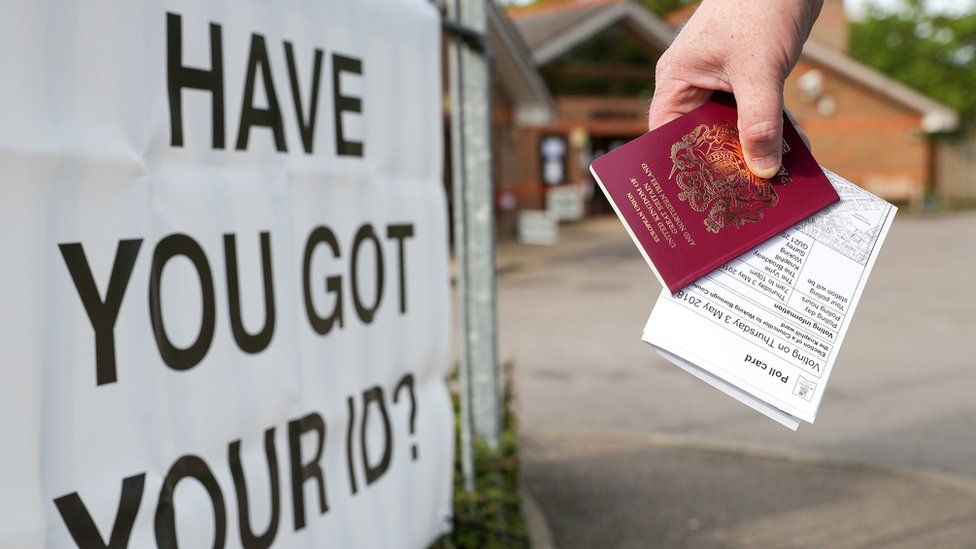
About 14,000 people were prevented from voting because they could not show an accepted form of photo ID during England's local elections, according to the Electoral Commission.
Ethnic minorities and unemployed voters were more likely to be turned away, research by the watchdog suggests.
"Significantly more" were put off voting by the requirement to show ID at polling stations, the report found.
The policy was rolled out for the first time in Britain in May's elections.
Data collected at polling station showed 0.25% of those who went to a polling station were not able to vote as a result of not being able to show ID, approximately 14,000 voters in total.
The true figure is thought to be higher as some of those who wanted to vote at polling stations might have turned away after reading the requirements at the entrance but were not formally recorded, the Commission said.
The figures are also based on incomplete data received from 226 of the 230 councils where polls were held this year.
Data collected by the Electoral Commission, the independent body that oversees elections, found "some correlation" between the numbers turned away and "specific socio-demographic factors, such as ethnicity and unemployment".
Craig Westwood, director of communications at the commission, said "it is too soon to draw conclusions", but added "some of the emerging evidence is concerning".
No cases of personation - where someone pretends to be another person, in order to vote - were reported during this year's elections. In 2022, there were 13 cases recorded by police, including seven at polling stations, none of which led to prosecutions.
Research published by the commission on Friday found 0.7% of voters were initially turned away from polling stations in May. Around two-thirds of these returned later in the day and were able to vote.
Labour's deputy leader Angela Rayner said the rules were having a "chilling effect on democracy" and called for a "comprehensive review into this discredited policy".
Ms Rayner said: "No legitimate voter should be locked out of democracy but that has been the effect of the Tories' failed voter ID regulations.
Lib Dem spokesperson Helen Morgan said the policy "looks like a transparent attempt at voter suppression by Conservative ministers who are desperate to stop people from holding them to account".
"It is an outrage that thousands of people were denied a voice at the local elections because of the Conservative Party's Voter ID rules," she added.
Gerrymandering claim
The government announced the voter ID move in 2021, arguing it would tackle voter fraud and boost public confidence in elections.
Passports, driving licences and blue badges are among the IDs permitted. Only 25,000 of the 90,000 free Voter Authority Certificates applied for before May's election were used as a form of ID.
There have been only a handful of convictions for electoral fraud in recent years - but ministers argue a lack of evidence could be masking the true level.
They also point out that voter ID has been a requirement in Northern Ireland since 2003, as well as in many other European countries.
Opposition parties voted against it, arguing it was unnecessary and would hit turnout among marginalised groups. In April, shadow foreign secretary David Lammy said Labour would get rid of the rule if it won power.
Conservative MP Sir Jacob Rees-Mogg, who was in the Cabinet when the measure was introduced, recently said the voter ID policy had been an attempt at gerrymandering - fixing rules to gain electoral advantage.
High awareness
He said the measure had come "back to bite them," claiming his party's vote had been hit because older people, who were more likely to vote Tory, were also more likely to lack an accepted form of identity.
Before the election, 87% of people in England were aware that they needed to show photo ID to vote at a polling station, according to a survey carried on behalf of the commission. The polling excluded London, which did not hold local elections in May.
Mr Westwood said: "The evidence suggests that the vast majority of voters were able to present an accepted form of ID at the May elections.
"But it also shows that some people were prevented from voting in polling stations due to the requirement, and significantly more did not attempt to because they lacked the required ID.
"Overall awareness was high and achieved in a matter of months, but we can see that people who lacked ID were less likely to know they needed to show it.
The commission plans to publish its full election report in September.
https://news.google.com/rss/articles/CBMiL2h0dHBzOi8vd3d3LmJiYy5jby51ay9uZXdzL3VrLXBvbGl0aWNzLTY1OTg4OTU50gEzaHR0cHM6Ly93d3cuYmJjLmNvLnVrL25ld3MvdWstcG9saXRpY3MtNjU5ODg5NTkuYW1w?oc=5
2023-06-23 03:22:17Z
CBMiL2h0dHBzOi8vd3d3LmJiYy5jby51ay9uZXdzL3VrLXBvbGl0aWNzLTY1OTg4OTU50gEzaHR0cHM6Ly93d3cuYmJjLmNvLnVrL25ld3MvdWstcG9saXRpY3MtNjU5ODg5NTkuYW1w
Tidak ada komentar:
Posting Komentar